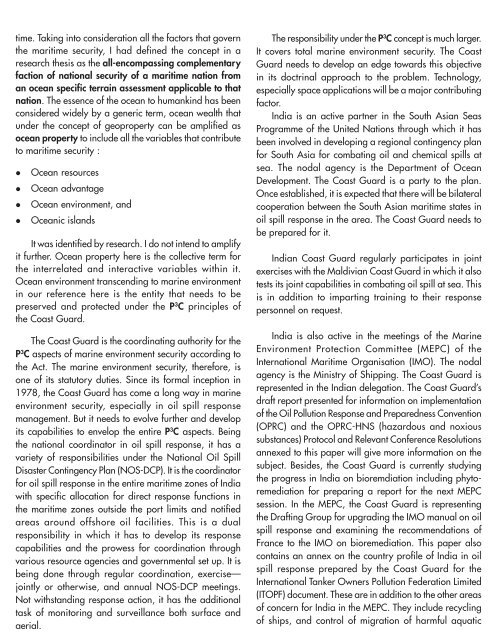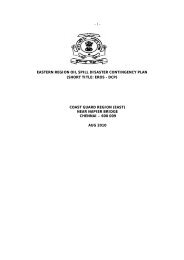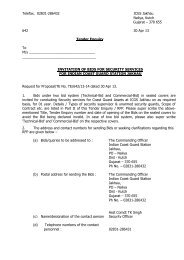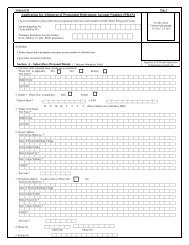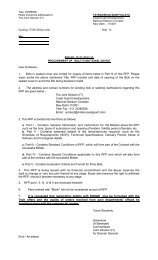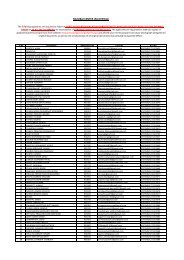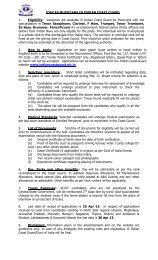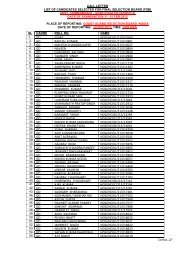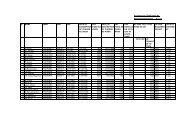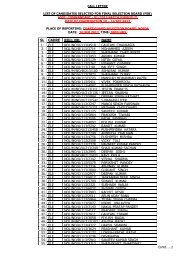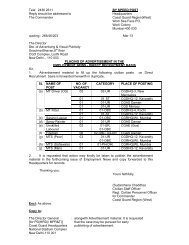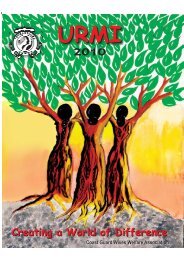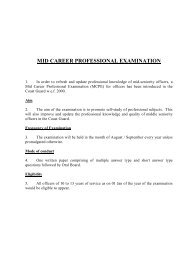editorial-FOR PRINT.pmd - Indian Coast Guard
editorial-FOR PRINT.pmd - Indian Coast Guard
editorial-FOR PRINT.pmd - Indian Coast Guard
You also want an ePaper? Increase the reach of your titles
YUMPU automatically turns print PDFs into web optimized ePapers that Google loves.
time. Taking into consideration all the factors that govern<br />
the maritime security, I had defined the concept in a<br />
research thesis as the all-encompassing complementary<br />
faction of national security of a maritime nation from<br />
an ocean specific terrain assessment applicable to that<br />
nation. The essence of the ocean to humankind has been<br />
considered widely by a generic term, ocean wealth that<br />
under the concept of geoproperty can be amplified as<br />
ocean property to include all the variables that contribute<br />
to maritime security :<br />
l<br />
l<br />
l<br />
l<br />
Ocean resources<br />
Ocean advantage<br />
Ocean environment, and<br />
Oceanic islands<br />
It was identified by research. I do not intend to amplify<br />
it further. Ocean property here is the collective term for<br />
the interrelated and interactive variables within it.<br />
Ocean environment transcending to marine environment<br />
in our reference here is the entity that needs to be<br />
preserved and protected under the P 3 C principles of<br />
the <strong>Coast</strong> <strong>Guard</strong>.<br />
The <strong>Coast</strong> <strong>Guard</strong> is the coordinating authority for the<br />
P 3 C aspects of marine environment security according to<br />
the Act. The marine environment security, therefore, is<br />
one of its statutory duties. Since its formal inception in<br />
1978, the <strong>Coast</strong> <strong>Guard</strong> has come a long way in marine<br />
environment security, especially in oil spill response<br />
management. But it needs to evolve further and develop<br />
its capabilities to envelop the entire P 3 C aspects. Being<br />
the national coordinator in oil spill response, it has a<br />
variety of responsibilities under the National Oil Spill<br />
Disaster Contingency Plan (NOS-DCP). It is the coordinator<br />
for oil spill response in the entire maritime zones of India<br />
with specific allocation for direct response functions in<br />
the maritime zones outside the port limits and notified<br />
areas around offshore oil facilities. This is a dual<br />
responsibility in which it has to develop its response<br />
capabilities and the prowess for coordination through<br />
various resource agencies and governmental set up. It is<br />
being done through regular coordination, exercise—<br />
jointly or otherwise, and annual NOS-DCP meetings.<br />
Not withstanding response action, it has the additional<br />
task of monitoring and surveillance both surface and<br />
aerial.<br />
The responsibility under the P 3 C concept is much larger.<br />
It covers total marine environment security. The <strong>Coast</strong><br />
<strong>Guard</strong> needs to develop an edge towards this objective<br />
in its doctrinal approach to the problem. Technology,<br />
especially space applications will be a major contributing<br />
factor.<br />
India is an active partner in the South Asian Seas<br />
Programme of the United Nations through which it has<br />
been involved in developing a regional contingency plan<br />
for South Asia for combating oil and chemical spills at<br />
sea. The nodal agency is the Department of Ocean<br />
Development. The <strong>Coast</strong> <strong>Guard</strong> is a party to the plan.<br />
Once established, it is expected that there will be bilateral<br />
cooperation between the South Asian maritime states in<br />
oil spill response in the area. The <strong>Coast</strong> <strong>Guard</strong> needs to<br />
be prepared for it.<br />
<strong>Indian</strong> <strong>Coast</strong> <strong>Guard</strong> regularly participates in joint<br />
exercises with the Maldivian <strong>Coast</strong> <strong>Guard</strong> in which it also<br />
tests its joint capabilities in combating oil spill at sea. This<br />
is in addition to imparting training to their response<br />
personnel on request.<br />
India is also active in the meetings of the Marine<br />
Environment Protection Committee (MEPC) of the<br />
International Maritime Organisation (IMO). The nodal<br />
agency is the Ministry of Shipping. The <strong>Coast</strong> <strong>Guard</strong> is<br />
represented in the <strong>Indian</strong> delegation. The <strong>Coast</strong> <strong>Guard</strong>’s<br />
draft report presented for information on implementation<br />
of the Oil Pollution Response and Preparedness Convention<br />
(OPRC) and the OPRC-HNS (hazardous and noxious<br />
substances) Protocol and Relevant Conference Resolutions<br />
annexed to this paper will give more information on the<br />
subject. Besides, the <strong>Coast</strong> <strong>Guard</strong> is currently studying<br />
the progress in India on bioremdiation including phytoremediation<br />
for preparing a report for the next MEPC<br />
session. In the MEPC, the <strong>Coast</strong> <strong>Guard</strong> is representing<br />
the Drafting Group for upgrading the IMO manual on oil<br />
spill response and examining the recommendations of<br />
France to the IMO on bioremediation. This paper also<br />
contains an annex on the country profile of India in oil<br />
spill response prepared by the <strong>Coast</strong> <strong>Guard</strong> for the<br />
International Tanker Owners Pollution Federation Limited<br />
(ITOPF) document. These are in addition to the other areas<br />
of concern for India in the MEPC. They include recycling<br />
of ships, and control of migration of harmful aquatic


